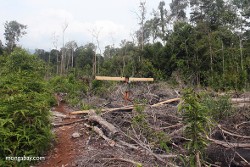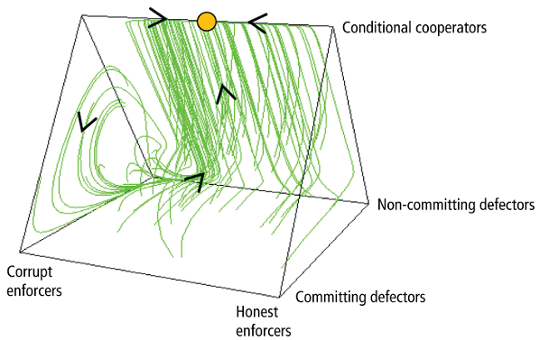Equitable governance of common goods
Long-established research by the Evolution and Ecology Program (EEP) on cooperation evolution has acquired new dimensions and additional momentum through the start of a new interdisciplinary cross-cutting project bolstering collaboration between EEP and IIASA’s Risk, Vulnerability and Policy (RPV) Program.
A range of studies have assessed the merits of alternative incentive schemes for promoting cooperative behaviors:
- A study published in the journal Nature Communications [1] investigated synergies between positive and negative incentives and introduce an optimal strategy, called “first carrot, then stick,” that boosts the emergence and stabilization of incentive-driven cooperation with maximal effectiveness and at minimal cost.
- Analyzing the evolution of incentive-based cooperation for voluntary and compulsory games, research highlighted the global stability of punishment-based cooperation under optional interactions whenever it is locally stable under compulsory interactions [2].
- Researchers showed that a voluntary reward system can overcome the threshold for achieving cooperation [3].
- In both well-mixed and structured populations, the paradox of altruistic peer-punishment can be overcome by randomly assigning the task of punishing defectors to pro-social players [4].
- Investigating a collective-risk social dilemma, research showed how difficult it is to overcome [5]. Cooperation is particularly threatened during periods of resource abundance.
- In an economic experiment, the social choice between self-justice and institutional enforcement was investigated [6]. The empirical results show that the latter can only stably emerge if punishment is meted out to those who do not contribute to the public good as well as to those who do not contribute to the sanctioning institution.
- While self-justice is threatened by vendetta-type escalation, institutional enforcement is threatened by the corruption of authorities. In the context of illegal logging [7] analyzed the interplay among foresters choosing between legal and illegal logging and law enforcers choosing between honest and corrupt behavior. Their findings highlight the importance of educating enforcers and of maximizing the spreading of information about corruption (Figure 1).
Figure 1. Conditional cooperation prevails if corrupt law enforcers can become known. Green curves and black arrows show the dynamics of social learning in the groups of foresters (up-down and near-far) and enforcers (left-right). The outcome of these adaptations is indicated by the orange circle: a fraction of enforcers are corrupt, while all foresters eschew illegal logging and commit to be overseen only by enforcers not known to be corrupt (click on image to enlarge).
This research is complemented by studies of situations that impose extra challenges on the emergence and stability of cooperative behaviors:
- Using adaptive dynamics theory, structured meta-populations were investigated to show how cooperation can evolve based on quorum-sensing [8].

Photographic evidence of illegal logging in Gunung Palung National Park, Borneo, Indonesia; © Rhett A. Butler, 2011.

Cross-border smuggling of logs from Myanmar to China; © Environmental Investigation Agency (EIA).
- Focusing on two-player games, researchers characterized large sets of partner strategies and rival strategies for the iterated prisoner’s dilemma [9] [10].
- Research showed how the evolution of fair sharing can be boosted by stochasticity in the ultimatum game [11].
- Recognizing the couple as the most basic unit of social interaction, a new book [12] analyzed mathematical models of relationship dynamics. Two studies [13] applied these techniques to famous cases in the fictional literature, while in [14] it was shown how very simple models of relationship dynamics can lead to mathematical and sentimental chaos.
References
[1] Chen X, Sasaki T, Brännström Å & Dieckmann U (2015). First carrot, then stick: How the adaptive hybridization of incentives promotes cooperation. Journal of the Royal Society Interface 12:20140935.
[2] Sasaki T (2014). The evolution of cooperation through institutional incentives and optional participation. Dynamic Games and Applications 4:345–362.
[3] Sasaki T & Uchida S (2014). Rewards and the evolution of cooperation in public good games. Biology Letters 10:20130903.
[4] Chen X, Szolnoki A & Perc M (2014). Probabilistic sharing solves the problem of costly punishment. New Journal of Physics 16:083016.
[5] Chen X & Perc M (2014). Excessive abundance of common resources deters social responsibility. Scientific Reports 4:4161.
[6] Zhang B, Li C, de Silva H, Bednarik P & Sigmund K (2014). The evolution of sanctioning institutions: An experimental approach to the social contract. Experimental Economics 17:285–303.
[7] Lee JH, Sigmund K, Dieckmann U & Iwasa Y (2015). Games of corruption: How to suppress illegal logging. Journal of Theoretical Biology 367:1–13.
[8] Seppänen A & Parvinen K (2014). Evolution of density-dependent cooperation. Bulletin of Mathematical Biology 76:3070–3087.
[9] Sigmund K & Hilbe C (2014). Chains between prisoners. Eureka (Journal of the Archimedeans, the Cambridge University Mathematical Society) 63:43–48.
[10] Hilbe C, Traulsen A & Sigmund K. Partners or rivals? Strategies for the iterated prisoner’s dilemma, in revision.
[11] Wang X, Chen X & Wang L (2014). Random allocation of pies promotes the evolution of fairness in the Ultimatum Game. Scientific Reports 4:4534.
[12] Rinaldi S, Della Rossa F & Landi P. Temporary bluffing can be rewarding in social systems: The case of romantic relationships. Journal of Mathematical Sociology, in press.
[13] Rinaldi S, Della Rossa F & Landi P (2014). A mathematical model of “Pride and Prejudice”. Nonlinear Dynamics, Psychology, and Life Sciences 18:199–211.
[14] Rinaldi S, Della Rossa F, Dercole F, Gragnani A & Landi P. Modelling love dynamics. World Scientific Series on Nonlinear Science Series A, in press.

CONTACT DETAILS
Principal Research Scholar Exploratory Modeling of Human-natural Systems Research Group - Advancing Systems Analysis Program
Principal Research Scholar Systemic Risk and Resilience Research Group - Advancing Systems Analysis Program
Principal Research Scholar Cooperation and Transformative Governance Research Group - Advancing Systems Analysis Program
Research program
Equitable Governance of Common Goods



